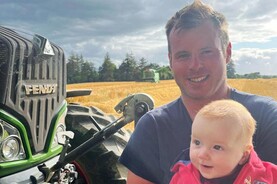Ground conditions have been excellent for planting winter cereals in Wexford, before heavy rain on Sunday night stopped work, but it also helped to kickstart germination on what has been planted.
Barty was hesitant about planting winter barley last week as it was still relatively early for his light land, but he is happy to have got it in with the uncertain weather forecast.
The land was ploughed before a pass of a ring-roller with paddles. A one-pass then sowed the barley. The seedbed was in excellent condition and dried off well between passes.
Barty was tempted to roll the barley after sowing as the ground was in such good condition, but he decided not to, given how it could cause damage if the weather turned wet before the crop has established. Orcade was the chosen variety, and it was planted at a little over 200kg/ha due to a very high thousand grain weight of 67g.
Barty has had winter malting barley in the past, but given the BYDV pressure he has experienced over the past couple of years which has had a huge impact on yield, he chose a BYDV-tolerant variety. Barty did not get a pre-emergence herbicide on, but will apply an early post-emergence spray if conditions allow. He may also add an aphicide into this mix.
The cover crops on the farm have not established very well this year.
Barty says they are quite patchy and are not providing complete ground coverage. He says this is down to late planting and cooler soil temperatures at the time of planting.
Now that the main work has finished and the farm is starting to quieten down, Barty is focusing on maintenance including full tractor services and machinery repairs.
Barty also notes that Irish farmers are not the only ones having to deal with a tough harvest this year. On a recent trip to France, he says that the vineyards were having lots of trouble harvesting the grapes due to wet weather.
There is a hive of activity in Tipperary as farmers try to make the best use of the favourable ground conditions. Pa Shine escaped much of the rain over the weekend, with just 5mm in the rain gauge, allowing him to keep ploughing and planting.
Pa started ploughing on 27 September and started planting winter barley. He then moved on to winter wheat before returning to barley on Monday when all the wheat was finished.
All ground is being ploughed, and as it is coming up relatively dry and with a nice tilth, Pa is going straight in with the one-pass on to the ploughing.

Pa has been busy ploughing and sowing winter cereals.
Belfry was the first winter barley variety to be planted. Pa planted it at 91kg/ha.
Hybrid varieties are planted at low seeding rates because of its vigorous tillering ability and lower plant density requirement. This barley is now starting to emerge.
Champion and Graham were the chosen winter wheat varieties, and these were planted at 140kg/ha and 157kg/ha, respectively.
Pa is now planting KWS Tardis winter barley at 188kg/ha.
Pa says it is still relatively early for his dry, warm land, but he is happy to have a good run at planting after it was near impossible to plant crops in decent conditions in the past two autumns, leading to patchy crops and a knock-on effect on crop rotation and spring crops.
Pa does not apply any pre-emergence herbicides, so he will try to apply an early post-emergence herbicide along with an aphicide, where required, to reduce the incidence of BYDV as much as possible.
While still early, Pa says he will probably start planting winter oats in the next couple of days once the barley is finished as he does not want to be caught out by a change in the weather.
The harvest continues in Westmeath with beans, spring oilseed rape and maize still to be cut. The spring beans have been disappointing so far, with yields of 1.5t/ac at 24% moisture.
Alex says it is another kick in the teeth this year. He still has a lot of beans to cut and he can’t see them doing any better. Some crops do seem to be thicker but there are still relatively few pods.
Half of the spring oilseed rape has been lifted. It is proving very challenging as the swarths are still damp and the combine has blocked up a few times already. The yield is OK, and considering that one-third of the crop was mulched earlier in the year because the crop is for seed, 0.6t/ac is not too bad. However, this is at a moisture content of 20%, which will lead to huge penalties.
Alex will also make a start on the maize in the next few days. The winter oilseed rape looks very good, in general, but about 20% of it is a bit patchy for no apparent reason.
Alex says that some plants are establishing later than the rest of the crop and he thinks it’ll be fine.

The spring beans harvest has been disappointing for Alex Butler so far.
Falcon was applied to the good areas last week; the poor areas will be given time to recover before it is applied.
Alex is up to date on the planting of winter barley, wheat, and oats. He is now waiting to harvest the rest of his crops before he plants these fields.
Fields are being planted the day after harvesting in general. The winter cereals have been planted in great conditions and the earliest fields have emerged.
Firebird Met (0.75l/ha) has been applied to the early-sown crops, and a pre-emergence herbicide will be used from now on.
Alex does not like changing his crop rotation but he is considering planting more winter cereals when the ground conditions are so good.





SHARING OPTIONS: